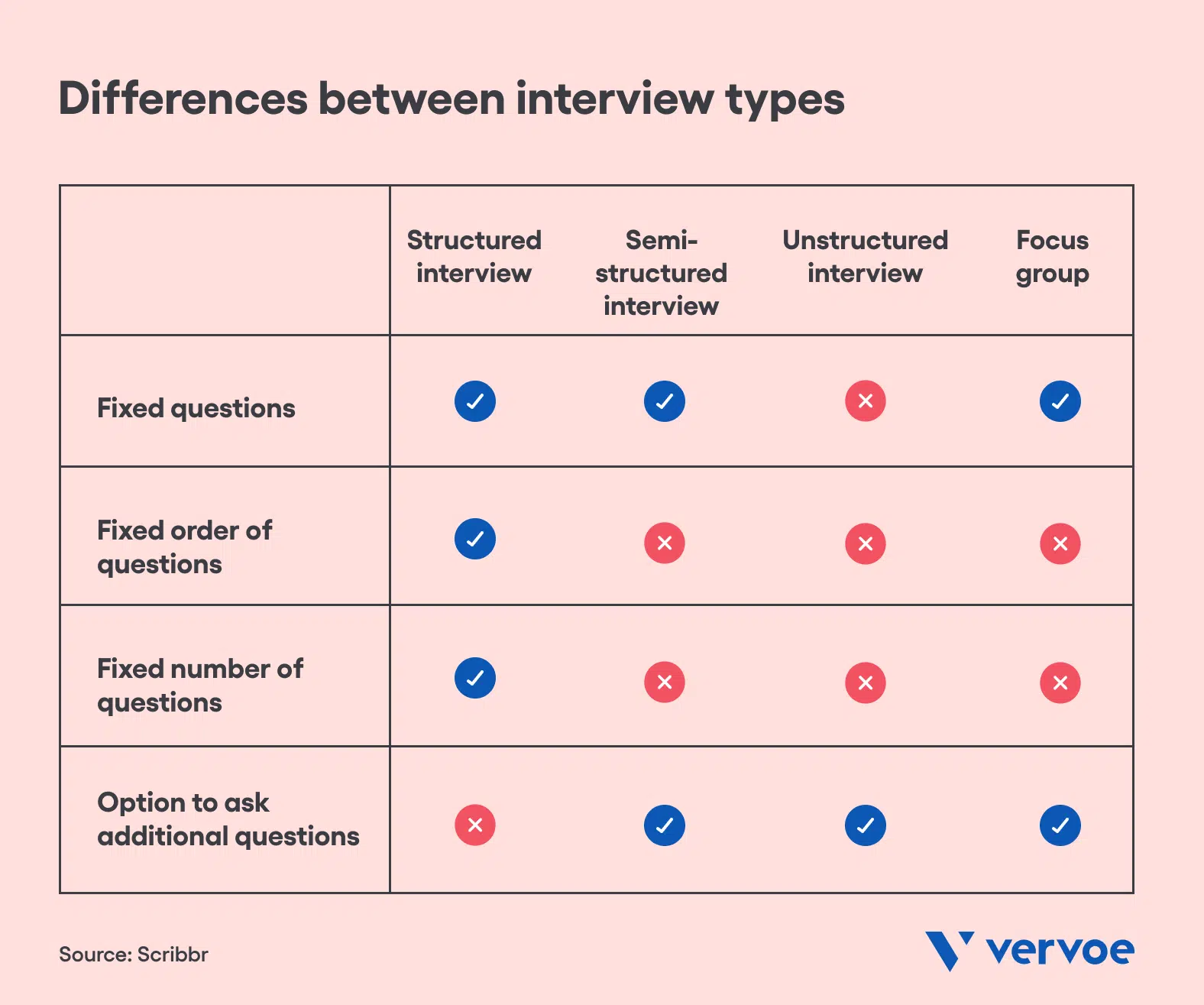The methods used to evaluate candidates and predict suitability are highly contested and debated among hiring managers and recruiters. While some swear by traditional (and outdated) processes like cognitive testing, others rely on methods such as job knowledge tests and work samples to indicate job fit.
Yet, according to a recent study, the debate ends here. A recent review of a 1998 meta-analysis has found that structured interviews are the #1 candidate evaluation method, causing a major reshuffle to previously acclaimed evaluation methods.
So, what exactly is a structured interview, and how can you implement it in your hiring process?
The findings — why are structured interviews now the #1 candidate evaluation method?
Frank L. Schmidt and John E. Hunter are among the most well-known names in organizational psychology (i.e., the study of human behavior in the workplace).
In 1998, they published a research paper called “The Validity and Utility of Selection Methods in Personnel Psychology.” Interestingly enough, for over 20 years, this research paper remained the most substantial and influential insight into predictive talent selection methods. Until recently that is, of course.
The original findings from the 1998 paper concluded:
- Cognitive tests, work sample tests, personality tests, and structured interviews were the best predictors of performance in the workplace.
- Of the methods, cognitive ability was found to be the number one predictor of performance.
- Predictability increased when employers combined quality selection tools (i.e., cognitive testing and work sample tests).
- Experience and education were found unlikely to be useful predictors of job performance.
So, what exactly has changed? While this study held its place for upwards of 20 years, new findings by researchers at the University of Minnesota and Indiana University have caused a major reshuffle to the order of best selection procedures.
According to the university meta-analyses review, the researchers have concluded that the following selection methods are now the most predictive of performance and business outcomes:
- Structured interviews
- Job knowledge tests
- Empirically keyed biodata (i.e., questions that assess someone’s past behavior to predict future performance — past experiences, education, training, abilities, personality, attitudes, interests, etc.)
- Work sample tests
- Cognitive ability tests
These recent changes recognize the shortcomings of cognitive testing, offering new insight into the value of methods like structured interviews and job knowledge tests (i.e., Vervoe).
What is a structured interview?
A structured interview is an interviewing method that requires hiring teams to use the same standardized process to assess all candidates applying for a role. This includes asking talent the exact same predetermined questions in the same order and using a standardized scoring system to assess candidates’ answers.
The idea behind structured interviewing is that it largely removes human bias from the process, reduces the likelihood of a bad hire, and allows hiring managers to compare candidates in an “apples to apples” approach.
Key organizations, such as Google, use structured interviewing to help adequately and comparatively assess candidates’ suitability for the role.
According to Dr. Melissa Harrell, a hiring effectiveness expert on Google’s People Analytics team, “structured interviews are one of the best tools we have to identify the strongest job candidates. Not only that, they avoid the pitfalls of some of the other common methods.”
The structured interview breakdown
By this point, you know that a structured interview is a set of predetermined questions asked sequentially and graded using a systemized scorecard. But what exactly does this look like in practice? Let’s take a closer look:
Structured interview questions — what to ask and when?
Interviewers should let the job competencies and required soft and hard skills guide them when determining the right questions to ask. For a structured interview, the questions are often behavioral, situational, or a combination of both.
Consider the following points when creating a structured interview format:
Behavioral questions
Behavioral interview questions are where an interviewer asks questions related to past situations to understand a candidate’s behavior. These questions can help demonstrate a candidate’s hard and soft skills, particularly the latter, i.e., teamwork, problem-solving skills, leadership, communication, time management, etc.
Example: “Tell me about a time when you had to deal with a difficult customer. How did you communicate effectively, and what was the outcome?”
Situational questions
A situational question is where an interviewer asks hypothetical questions to assess how a candidate would react and handle realistic work-related scenarios. Much like behavioral questions, situational questions also help to reveal different elements of a candidate’s hard and soft skills, depending on the questions asked. Additionally, it gives employers insight into whether or not a candidate is a good cultural fit for the organization.
Example: “If you saw SEO metrics decreasing weekly, what would be your approach to rectify the issue? Please explain how you’d apply your technical knowledge and skills.
Upon determining what questions will help you best assess a candidate’s suitability for the role, you’ll need to decide on an appropriate order of questions and ensure this remains consistent across all interviews. Your best bet is to print your questions up in order of priority, simply working off a structured list.
Scorecard rating system — what is it, and how does it work?
Without the right grading system, the work you put into creating the right questions will have little impact. A systemized scorecard is an effective way to rate candidates and compare them side by side, ensuring you are assessing their competence and suitability against a predetermined set of criteria rather than letting your unconscious biases influence your decision-making.
Generally, the criteria used on a scorecard will look different from business to business. Based on the hard and soft skills you’re trying to evaluate through your questions, write these down and include three columns next to each skill for bad, average, and good.
For example, the structured interview questions above may look something like this on a scorecard:
| Question | Skill | Rating | ||
| “Tell me about a time when you had to deal with a difficult customer. How did you communicate effectively, and what was the outcome?” | Conflict resolution | Bad | Average | Good |
| Communication | Bad | Average | Good | |
| “If you saw performance SEO metrics decreasing weekly, what would be your approach to rectify the issue? Please explain how you’d apply your technical knowledge. | SEO principles and knowledge | Bad | Average | Good |
| Attention to detail | Bad | Average | Good |
The three interview types — structured, semi-structured, and unstructured
As the most systematized type of interview, a structured interview differs from semi-structured and unstructured interviews. Consider the following comparison of the three interview types:
| Interview type | What it is | When to use it |
| Structured interview | A predetermined list of questions asked in the same order to every candidate. | If you want to accurately compare candidates to assess who is most suitable. If you are short on time and resources and need a quick and accurate comparison. If you have a clearly defined candidate persona with specific characteristics. If you want to assess candidates objectively and fairly to reduce bias in your interview process. If you have knowledgeable interviewers (i.e., subject matter experts) who understand what a bad or good response looks like. |
| Semi-structured interview | A few questions are predetermined, and the remaining questions are determined by the direction of the conversation. | If you want to compare candidates side by side for certain questions, while also seeing where the conversation naturally goes. |
| Unstructured interview | None of the questions are predetermined. Instead, the interviewer engages in a free-flowing conversation and allows the direction to influence what questions are asked. This means candidates are likely asked different questions and can’t be compared side by side. | If you want more personal and informal interviews where candidates feel comfortable answering naturally and honestly. |
According to Scribbr, here’s an aerial shot of how the three interview types differ in practice:

The pros and cons of structured interviews
As with all hiring processes, there will always be positives and negatives. Yet, when unbiased, accurate, and fair hiring decisions are the goal, the benefits of structured interviews far outweigh the negatives. And let’s not forget, according to the most recent meta-analysis review, they are the most effective method to predict performance.
| Structured interviews | |
| Pros | Cons |
| They reduce human bias as candidates are all measured against the same set of criteria | They’re formal and structured, which can make candidates feel uncomfortable |
| They specifically assess candidates on the skills and qualities required to succeed in the role | They’re inflexible, meaning there’s little room to alter questions without impacting the interview |
| Reduce interview mistakes and missed opportunities as the questions are already predetermined | They may lack a natural feel if the interviewer isn’t used to the process, which can impede a candidate’s ability to answer honestly |
| They improve an organization’s chances of finding a candidate whose skills align with the role, improving quality of hire |
To further cement these findings, Google’s hiring team experimented with implementing structured interviewing for select groups. Here are their findings:
- Structured interviews are better at predicting who will succeed in the role — Google compared interview scores to performance scores across multiple functions and levels within the company and found that those who went through the structured process performed better.
- The interview process is easier and more efficient — They found that using predetermined, quality questions and rubrics (i.e., scorecards) saved their talent acquisition team 40 minutes per interview, on average. Additionally, Googlers reported feeling more prepared for the interview.
- Structured interviews improve the candidate experience — Upon trialing structured interviews, they witnessed more candidate satisfaction in their feedback scores — particularly for unsuccessful candidates. According to Google’s findings, unsuccessful candidates who went through a structured interview process reported 35% higher satisfaction than those who did an unstructured interview.
Final thoughts
It’s not hard to understand why structured interviews have found their way to the top of the candidate evaluation ladder — they allow employers to understand a candidate’s hard and soft skills and help to reduce bias in the hiring process.
Yet, are they a standalone solution to hiring better quality candidates? In our opinion, no — it’s only one piece of the recruitment puzzle, albeit an important one. For a structured interview to really hold its place and value, it requires one further step: validation of said skills.
While structured interviews can test a candidate’s soft skills, this approach is even more effective when paired with a skills assessment like Vervoe, allowing them to demonstrate both hard and soft skills in practice through a real-life job simulation.
A skills assessment tests candidates’ skills in an environment that mimics the nature of the role (i.e., a developer can do a code challenge, and a copywriter can write an introduction to an article). Combining the two approaches strengthens hiring decisions — allows talent acquisition teams to understand a candidate’s skill set theoretically and practically.
Find out more about Vervoe’s skills assessments: see the product in action, start a free trial, or book a demo.




















